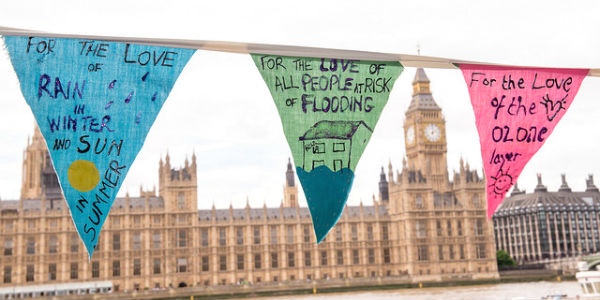How MPs can make a case for action on climate change, even if voters aren’t yet interested
Voters are simply not asking their representatives to act on climate. Rebecca Willis draws on interviews with MPs to find whether they can construct a ‘representative claim’ and justify action on climate change.

Climate lobbying event, Parliament. Picture: Climate Coalition (UK), via (CC BY-NC-SA 2.0)
Scientists are clear that urgent action is needed on climate. At the Paris Summit, world leaders agreed to limit rises in global temperatures. And yet, climate change barely troubles domestic politics. As part of a collaborative research project with Lancaster University and Green Alliance, I have interviewed over 20 members of the UK parliament since 2015. One message has emerged with striking clarity: the electorate are not asking their representatives to act. In the words of one of my interviewees, “Voters don’t ask about it. We go out and knock on doors, and we speak to people, and I don’t know if I’ve ever been asked about climate change, ever.”
This is a fundamental dilemma for politicians. Most of them know what needs to be done. Yet they get their mandate from voters, who are not asking them to do anything at all. How can they square this circle?
The answer to this question boils down to the way in which political representation is understood. This is something that has been debated ever since the Ancient Greeks’ early experiments with democracy. In the UK parliamentary system, we tend to think about representation in terms of the electoral constituency. MPs represent the local area that elected them. But they are influenced, not controlled, by what their electorate tells them. They are representatives, not delegates. This is explained well by a new theory put forward by the political theorist Michael Saward. He argues that representation should be seen as a process of claims-making, in which the politician makes claims which are then accepted, rejected or ignored by the electorate. In short, representation is a dialogue. When an MP campaigns against a hospital closure, they are, in effect, saying “I am campaigning for local health services and this makes me a worthy representative of this area”. Saward calls this a “representative claim”.
Saward’s theory helps to explain how MPs might tackle a complex global issue like climate change. It’s a harder sell than the local hospital, that’s for sure. But my research shows that MPs develop ways of claiming that action on climate change is necessary. In my interviews with MPs, I encountered four different sorts of “representative claim”.
A cosmopolitan claim: This frames climate change a global problem to which a global solution is proposed. Politicians argue that it is in the interests of the global community to take action. As one interviewee told me, “a lot of the impacts of climate change are going to hit other places before they hit here. [My constituency] is not likely to be one of the first places to be hit particularly badly. So what? I just happen to be here.”
This claim has the advantage of acknowledging the global dimensions of the problem. Yet it has limited appeal, as another explained, given that many people “fundamentally care about themselves, their environment, their friends, their local space… We have these sort of massive big things about what will happen in other parts of the world… and they’re like, ‘yeah, ok, whatever’.” In short, this claim is often ignored.
A local prevention claim: Another strategy is to tailor the claim explicitly to a local setting, saying that action is necessary to prevent local impacts like flooding. One MP representing a flood-prone area told me that he used floods as a way of talking about wider climate impacts. This claim has the advantage that it links a global issue directly to the local area, and allows a politician to talk in terms of the interests of local people. As with the cosmopolitan claim, though, it does not link directly to a case for local action to reduce greenhouse gas emissions.
A co-benefits claim: The most common strategy that interviewees reported was linking climate change to practical, achievable local actions, particularly economic measures, such as encouraging renewable energy generation, or improving transport infrastructure. This has the obvious advantage of relevance to the local area. As one MP told me, “I’m happy to use an economic argument if that means that more people will come on side… I change the language to be much, much less extreme.” The disadvantage of such a claim, though, is that it may reduce the opportunity to discuss the full implications of climate change, focusing instead on small steps at a local level.
A surrogate claim: A significant minority of MPs in my sample use an intriguing strategy, which I call the ‘surrogate claim’. This approach involves promoting local benefits, like public transport, or reduced congestion, with no mention of carbon savings or climate change. In this case, although the politician is privately thinking of a particular strategy in terms of its climate benefits, they deliberately do not mention this, because they think it would backfire. One judged that, if he had mentioned carbon emissions in arguing for a sustainable transport scheme, “there would have been a rolling of eyes and saying, ‘oh here he goes again’”.
These findings are relevant both for the way we understand representation, and for thinking about how we might tackle climate change. My study confirms that politicians construct their representative role in an active sense, as Saward describes. Politicians know that climate change requires political attention, and so they find ways of building a claim that is meaningful to the people they represent. Seeing representation in this way overcomes the vexed questions of whether politicians can or should represent nature or other species; people beyond their constituency; and over the long-term rather than a single electoral cycle.
The answer is deceptively simple: they can, and should, if they can make a representative claim which is accepted. Implicit in the theory, however, is the idea that some claims are harder than others to sustain; a claim like the cosmopolitan claim identified here, based on the long-term interests of a globalised humanity, will find it more difficult to gain traction than a claim which represents immediate local interests. Thus the theory provides a nuanced account of the way in which politicians conceptualise their role as a representative.
The research also points to ways in which politicians could be better supported. Demonstrating wide buy-in, from other interest groups beyond the environment community, will help to develop claims that are more widely accepted. Second, politicians might be tempted to use a surrogate claim, trying to get the right policies in place without seeking a mandate for action on climate. But such an approach is ultimately self-defeating, as it does not help to build the case. Last, it’s both legitimate and necessary to think of all policies and actions in terms of whether they will build public support. Who will it appeal to? Does it help to make the wider case for action? It is only by making bold, positive claims that a political, as well as scientific, case for action on climate can be made.
Note: the above draws on the author’s published work in Political Studies.
The article gives the views of the author and not Democratic Audit. It was originally published on the LSE British Politics and Policy blog.
 Rebecca Willis is a Researcher in the Department of Sociology at Lancaster University.
Rebecca Willis is a Researcher in the Department of Sociology at Lancaster University.





 Democratic Audit's core funding is provided by the Joseph Rowntree Charitable Trust. Additional funding is provided by the London School of Economics.
Democratic Audit's core funding is provided by the Joseph Rowntree Charitable Trust. Additional funding is provided by the London School of Economics.
I have to confess that I find your results from 20 MPs a bit surprising. How come this MP reports: ” I don’t know if I’ve ever been asked about climate change, ever.” We all know about climate change – we’ll there may be a few who don’t – and a certain number who deny it.
So might there be an issue with the methodology.
1. Might it be that MPs are already a selected group who’ve won the election in their constituency? In our first past the post system, the most populist candidate is likely to win. Will he/she have been less likely to have been in settings where people will discuss climate change? Maybe they are paying lip service to the issue anyway.
2. I assume there were no Green MPs in the selection.
3. The media tend not to rate climate change as an issue. There are a variety of reasons for this.
4. Voters may see climate change as a global issue which the MP could not address.
What a crazy system where our “representatives” don’t actually represent us! I’ve voted all my life and never had an MP represent me.